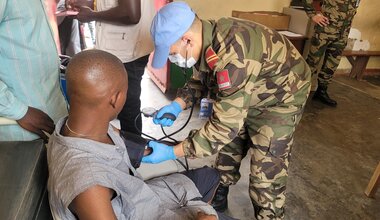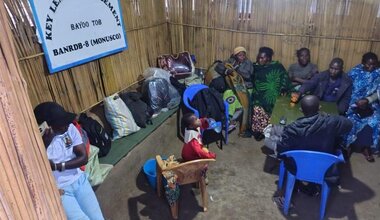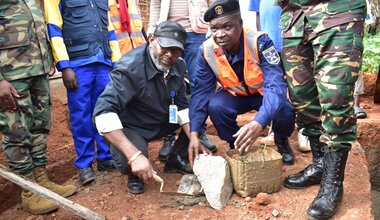Pillay cites 'appalling' human rights record of leaders of M23 mutineers, fears further abuses
Geneva, 19 June 2012 - The UN High Commissioner for Human Rights, Navi Pillay, expressed deep concern Tuesday about the safety of the civilian population living in the east of the Democratic Republic of the Congo (DRC) as fighting continues between the Congolese army and the M23 movement, which has been conducting a mutiny in North Kivu Province under the leadership of a particularly notorious group of human rights violators.
"The leaders of the M23 figure among the worst perpetrators of human rights violations in the DRC, or in the world for that matter," Pillay said. "Many of them have appalling track records including allegations of involvement in mass rape, and of responsibility for massacres and for the recruitment and use of children."
"Many of them may have been responsible for war crimes," she added. "I fear the very real possibility that they will inflict additional horrors on the civilian population as they attack villages in eastern DRC."
The M23 is composed of army deserters, formerly belonging to the armed groups CNDP and PARECO, who were integrated into the national army following a 2009 peace agreement. The senior leadership of M23 includes Sultani Makenga, a Colonel and former rebel leader alleged to have been involved in civilian killings and recruitment of children for use in combat, and Bosco Ntaganda, an army general wanted by the International Criminal Court (ICC) on charges of war crimes for recruiting and using children in combat in the northeastern district of Ituri in 2002-2003.
In North Kivu alone, clashes between the M23 and the Congolese army have already driven some 218 000 people to flee their homes since April 2012.
"Every effort must be made to hold these men, and the soldiers under their command, accountable for human rights violations committed against civilians -- both for crimes committed within the context of the current mutiny, and also for offences committed previously," Pillay said.
Pillay expressed particular concern that the practice of recruiting and using children has been maintained until very recently, as shown earlier this month when MONUSCO succeeded in rescuing 20 minors from the 811th Regiment of the Congolese army (FARDC), previously under the command of Colonel Innocent Zimurinda, a current M23 member and former CNDP commander. The children had been recruited in North Kivu province between 2008 and January 2012.
Pillay called on all parties, including the FARDC, to respect international humanitarian and human rights law and to take all necessary measures to ensure the protection of the civilian population.
Key leaders of the M23 include the following individuals, all of whom are mentioned in the 2009 Final Report of the Group of Experts on the DRC (S/2009/603) as being among the FARDC commanders with an established record of human rights abuses:
Colonel Sultani Makenga. In addition to the recruitment and use of children, violations attributed to Makenga include involvement in the Kiwandja massacre of 4-5 November 2008, when CNDP troops executed at least 67 civilians -- mainly young men -- in Kiwandja, North Kivu; and the Buramba massacre of March 2007, when FARDC troops (ex-Bravo Brigade) allegedly executed at least 14 Hutu and Nande civilians in Buramba area, North Kivu.
Colonel Baudouin Ngaruye. In addition to the recruitment and use of children, human rights abuses attributed to Ngaruye include responsibility for the so-called Shalio massacre of 27-30 April 2009, when FARDC (mostly ex-CNDP) troops attacked Hutu refugees and FDLR dependants in Shalio, North Kivu, and allegedly killed or made disappear 139 people and abducted approximately 40 women, some of whom were gang-raped and mutilated.
Colonel Innocent Zimurinda. Zimurinda is alleged to have had command responsibility for the Kiwandja and Shalio massacres. He also stands accused of recruiting and using children. For these reasons, on 1 December 2010, his name was included in the "List of Individuals and Entities Subject to Travel Ban and Assets Freeze" administered by the Security Council Sanctions Committee on the Democratic Republic of the Congo.
Colonel Innocent Kaina. Kaina is alleged to have been involved in a range of human rights abuses including crimes committed in Ituri, Orientale province, in 2004 when he was -- together with Bosco Ntaganda -- a member of Thomas Lubanga Dyilo's Union des patriotes congolais (UPC) / Forces patriotique pour la libération du Congo (FPLC). Arrested by DRC authorities in June 2006, he was released in January 2009 without trial.
General Bosco Ntaganda. Ntaganda was indicted by the International Criminal Court on 22 August 2006 for war crimes -- namely the recruitment and use of children under the age of 15 -- committed in Ituri, Orientale province, in 2002-2003, when he was the Deputy Chief of General Staff of the UPC/FPLC. The FPLC was the armed wing of the UPC founded in September 2001 by Thomas Lubanga Dyilo, who recently became the first person to be convicted by the ICC.
Ntaganda is mentioned in the 2009 Final Report of the Group of Experts on the DRC (S/2009/603) among the FARDC Commanders with an established record of human rights abuses including command responsibility, as CNDP Chief of Staff, for the Kiwandja massacre of 4-5 November 2008 as well as for the recruitment and use of children. He is also mentioned in the "List of individuals and entities subject to travel ban and assets freeze" administered by the Security Council Sanctions Committee on the Democratic Republic of the Congo.
 UN
UN United Nations Peacekeeping
United Nations Peacekeeping





